May 2015
Interview for Q Magazine
From writing Yesterday... to collaborating with Kanye - AT HOME WITH A POP GENIUS
Press interview • Interview of Paul McCartney
Last updated on December 26, 2024
May 2015
Press interview • Interview of Paul McCartney
Last updated on December 26, 2024
Interview Apr 30, 2015 • Paul McCartney interview for The Sun
Rehearsal May 01, 2015 • South Korea • Seoul
Interview May 2015 • Paul McCartney interview for Q Magazine
Concert May 02, 2015 • South Korea • Seoul
Next interview May 19, 2015 • Paul McCartney interview for Evening Standard
Officially appears on Tug Of War
Officially appears on Beatles For Sale (Mono)
Give Ireland Back To The Irish
Officially appears on Give Ireland Back To The Irish
Officially appears on Hello, Goodbye / I Am The Walrus (UK version)
Officially appears on Hope For The Future (Digital EP)
Officially appears on Ram - Archive Collection
The interview below has been reproduced from this page. This interview remains the property of the respective copyright owner, and no implication of ownership by us is intended or should be inferred. Any copyright owner who wants something removed should contact us and we will do so immediately.

Paul and Linda McCartney’s first child, Mary, came into the world at London’s Avenue Clinic in the summer of 1969. It was a great time, and one her parents wanted to savour. “Nowadays they chuck you out of hospital after a couple of days,” says Sir Paul McCartney in that familiar singsong voice. “Back then, they kept mums and babies in for a week.”
Life was good. “I’d just been given an acetate of Abbey Road, which sounded great,” he recalls. “We had a glorious new baby and a week staying in this clinic where the chips were to die for.”
However, even a newborn baby and a plate of fantastic chips couldn’t completely distract the songwriter. A print of Picasso’s The Old Guitarist hung in Linda’s room. After three days of looking at the picture, McCartney had to find out what chord that old guitarist was “playing”.
Perched on a sofa next to Q, McCartney strums the same chord on his acoustic guitar, and then whistles a melody.
What McCartney could never have imagined was that 46 years later that melody would turn up on hip-hop superstar Kanye West’s recent track, All Day, a song notorious for his liberal use of what Sir Paul calls “the ‘n’ word” and a combative and heavily bleeped performance at the Brit Awards.
“My 40-year-old whistling riff came back to me on Kanye’s song as this big industrial noise,” marvels McCartney, miming hands on a keyboard. “Duh-Duh-Der-der-der-der…”
Then came the phone calls expressing concern that Paul McCartney was associated with a song containing such provocative lyrics. “I think he mentions the ‘n’ word about 40 times,” he says. “It’s controversial, I know, especially with the climate in modern-day America.”
One person that wasn’t impressed was McCartney’s wife, Nancy Shevell. “It really shocked Nancy, because she’d been to school with a lot of black kids and been immersed in that experience.”
But McCartney wouldn’t budge. “Whether you like what Kanye does or you don’t, he’s an artist and it’s his prerogative,” he insists. “His school of thought is that he’s reclaimed the ‘n’ word, he’s re-appropriated it.”
In February, McCartney watched Kanye’s performance of All Day at the Brits, complete with onstage mob and flamethrowers. “I thought it was great. I really did. I love his balls. If you’re gonna work with Kanye you have to accept who he is.” He pauses. “It’s Kanye… Come on, not… Gordon Lightfoot.”
He stops and laughs. Whatever happened to folky ’70s songwriter Gordon Lightfoot, I wonder? “I dunno,” shrugs McCartney, “I was just trying to think of someone that was the complete opposite of Kanye West.”
WHETHER YOU LIKE KANYE WEST OR NOT, HE’S AN ARTIST AND IT’S HIS PREROGATIVE. HE SAYS HE’S RECLAIMED THE ‘N’ WORD.
It’s a long road from Yesterday to All Day. But McCartney’s hip-hop collaboration is just another detour on his six-decade songwriting journey. “Writing songs,” says Paul McCartney, “is like following a trail -and you never know where it will lead you.”
IToday, the trail has led us to McCartney’s studio in rural Sussex. Rabbits snuffle around the garden and the English Channel shimmers in the distance. There are worse places to work. A quick scan of the studio kitchen reveals a copy of Mary McCartney’s recipe book and a John Lennon calendar; March’s pin-up is “Moody John” in sunglasses posed against the New York skyline.
It’s a few steps from the kitchen to the studio, which is filled with the tools of McCartney’s trade, including a Wurlitzer, Mellotron and his world-famous Höfner bass. Dressed all in black and impressively skinny, the years, all 72 of them, have been pretty kind to Paul McCartney.
He’s here to talk about writing songs and, as it turns out, to give Q an unexpected masterclass in how he does it. McCartney’s passion for his craft is undiminished. But so, too, is his audience’s passion for his songs. McCartney’s latest UK tour sold out in an hour. Then you remember that he’s shifted more than 100 million singles and around the same number of albums.
Those pop hits alone – Yesterday, Let It Be, Penny Lane, yes, Mull Of Kintyre – have made McCartney one of the most, if not the most, successful composers in the world. And it all started with Gene Vincent’s Be-Bop-A-Lula.
“That was the first single I ever bought,” he says. “Got it in Curry’s in Liverpool. Got it back to the house in its bright purple wrapper…”
If Gene Vincent lit the spark, then the first step towards writing songs began with McCartney trying to play the Buddy Holly and Elvis hits he loved on his guitar. “And then I started to think, ‘Maybe I could make something up myself.'”
Paul McCartney wrote his first song, I Lost My Little Girl, when he was 14 in 1956. McCartney picks out a bluesy figure on the acoustic and starts singing: “Well, I woke up late this morning and my head was in a whirl…” It’s a strange experience having Paul McCartney singing a few inches from your face.
Actor Dustin Hoffman tells a story about meeting McCartney in Jamaica in the ’70s. Hoffman had been reading about Picasso – that man again – and his last words before dying. He challenged McCartney to write a song about it on the spot. When he started doing so, Hoffman leapt from his chair, exclaiming: “He’s doing it! It’s coming out!” – as if McCartney was giving birth. Picasso’s Last Words (Drink To Me) ended up on Wings’ 1974 album, Band On The Run.
Hoffman’s response was a bit melodramatic. But there is a mystique to songwriting for those that don’t do it. “There’s still a mystique to those that do,” McCartney insists. Ask him what the triggers are for writing a song, and he answers straight away.
“Get the first line. It doesn’t matter if it’s rubbish, bomb through, and change it later, sing anything to get started…” He starts playing the guitar and singing anything – “[Mumbling] ‘I can tell you baby… The holiday’s coming’… ‘No, the weekend’s coming’ – that’s better – ‘And we’re gonna have a good time…’ Or find a title you like, something that spurs you on. Like Eight Days A Week.” A phrase McCartney heard his driver use in 1964 and which he rushed off to tell John Lennon about.
Have you ever felt shy about playing someone a song? “Shy, embarrassed, yes, if it’s not finished” he says. “The trick is to go off on your own and finish it. Go into the toilet – toilets are good. Separate yourself.” The joy of songwriting, says McCartney, is, “Going from this dark moment where there’s nothing to having a song, this thing that didn’t exist before.”
McCartney has written some of the world’s most famous love songs, but has he ever worried about revealing too much of himself?
“Yes, but you’ve got to get over that feeling quickly, because that’s the game.” Some songs turned out to be more personal than he realised when he was writing them. The Beatles’ Yesterday will be 50 years old in August. McCartney famously dreamed the melody. But its opening line was originally, “Scrambled eggs/Oh my baby, how I love your legs.” McCartney followed his own advice and “bombed through”, ending up with a universally known song about loss and regret. But its initial spur was more prosaic.
“There are a lot of mindsets when you’re writing a song – and one of them is commercial,” he admits. “It’s like any job, where if you do a certain thing you’ll progress in that job. In songwriting it’s an unspoken thing, but I recognise it. I remember hearing somewhere that people like sad songs, so I thought, ‘OK, I’ll write a sad song.’ I knew what I was getting into…” So, in a way, you were acting when you wrote it? “Yes. I wrote from the point of view of someone who was sad. But when you’re taking on a part, it’s usually you you’re writing about. Your psychiatrist would say it’s you.”
Later, someone suggested that lyrics such as, “Why she had to go, I don’t know” were about McCartney’s mother who’d died when he was 14. “I certainly felt that way when she died. So when I sing Yesterday now, it does make me think about my mum. It’s more personal than I realised it was.”
You sense that the older he gets, perhaps the more McCartney is prone to analysing his gift. “Someone pointed out to me that a lot of songwriters who are quite successful suffered a similar tragedy. My mum died young. John’s did. Bono’s did. Kanye’s did. I keep reading interviews with songwriters saying, ‘Oh, my mum died…'”
MY MUM DIED YOUNG. JOHN’S DID. BONO’S DID. KANYE’S DID. A LOT OF SUCCESSFUL SONGWRITERS SUFFERED A SIMILAR TRAGEDY.
Downstairs in the recording studio, Paul McCartney is having his photograph taken: with his bass, at the piano, at the drums… On the other side of the studio glass, an engineer is re-mastering 1982’s Tug Of War album (big hit: the Stevie Wonder duet, Ebony And Ivory). McCartney has been busy of late, re-mastering his solo and Wings back catalogue; a job that’s thrown up good and bad surprises.
He was pleased to rediscover Tug Of War’s other Stevie Wonder duet, What’s That You’re Doing. But when recently rehearsing the 1975 track Rock Show, with its lyrics about “axes”, “stacks” and “Jimmy Page”, McCartney found himself thinking, “This is shit…”
Everyone has a favourite Paul McCartney song – and, given the chance, will tell him what it is. “I met a guy in New York who said, ‘Do you know what your greatest song is?’ And I said, ‘No’, cos I don’t, [from The Beatles’ ‘White Album’]. I asked him why and he took me through it. It’s a song that’s always developing, always moving. Then someone else told me that their daughter played I Will at a school concert. So we’ve got to do it now. I’ve got to re-learn it.”
SEX IS SOMETHING I PREFER TO DO, RATHER THAN SING ABOUT. SINGING ABOUT SEX IS NOT REALLY IN MY GENRE.
What’s the worst song you’ve ever written, then? “Bip Bop [from’71’s Wild Life]. The lyrics are fucking awful,” he grins, and then starts singing: “‘Bip bop, bip bip bop, Bip bop, bip bip band, Dig your bottom dollar, put it in your hand…’ But[producer] Trevor Horn told me, ‘That’s one of my favourites’. I can’t hate it that much, can I? There must have been a reason I liked it in the first place.”
In 1970, when McCartney released his first solo album, the world was teeming with priapic rock bands singing about – in the parlance of the day – “having it off”. The BBC banned Wings’ 1972 hit Hi Hi Hi for its references to sex and drugs. But love, rather than sex, has always been McCartney’s songwriting forte. Why is that? *#*#For a split second, he looks a bit awkward. “Sex is something I prefer to do, rather than sing about. Hi Hi Hi was from a period when everybody was getting stoned and having sex… I suppose singing about sex is not really in my genre.”
It’s odd to hear McCartney, who’s just worked with Kanye West, talking about “my genre”. “When the Stones sung about sex they came at it from that blues tradition, where it was black guys getting one over on the white folks with hidden meanings,” he explains. “You know, ‘I’m like a one-eyed cat peepin’ in a seafood store…’ Where the one-eyed cat is, er, the penis.
“It’s the same with trying to write angry songs,” he continues. “I can’t do it.” Really? “Yes. I wrote a song called Angry. Recorded it here with Phil Collins and Pete Townshend. At the time I thought, ‘Wow, we’ve really slammed this…’ I can be angry but I can’t find a natural way to put it into a song. It’s the same with sex. I don’t come from that ‘one-eyed cat’ tradition.” He sounds almost apologetic. “I did a song called Rode All Night… ‘Rode all night with my mama,’ he sings. “That’s about sex.”
Has he ever heard another artist’s songs and felt jealous? “Not so much jealous, maybe more inspired. Years ago, I really liked Billy Joel’s Just The Way You Are and Sting’s Fields Of Gold.” Has he told Sting that? “No, never. I probably like those songs because they’re a bit me, aren’t they? I could have written them. But I can’t get too jealous, because I’ve done too well. There is still some logic in my brain – ‘Give it up, man, don’t go there!'”
McCartney insists that he’s never found songwriting that difficult, and he’s certainly never played the tortured artiste. “I don’t think of anything I’ve written as being hard. Some songs did come easier than others, some, like Yesterday and Michelle, just fell out.”
What happens after they fall out is a different matter, though. There have been some he thinks should have been bigger hits.
McCartney’s last album, 2013’s New, was his best work in ages, and went Top 5 around the world. However, the 2014 single, Hope For The Future (written for the hugely successful video game Destiny) wasn’t a hit in its own right. “That was my most recent flop,” he laughs, “and I thought that would be a big hit. I really did.”
Any others? “Yeah, [the 1972 Wings single] Give Ireland Back To The Irish.” That song received a blanket radio ban because of its political sentiment. But McCartney sees it as an anomaly. “I’m not good at protest songs, the way some people are. They have a different mindset to me.”
McCartney’s interest in the “different mindsets” of other songwriters greatly intrigues him, and has led him on a new and unexpected path.
“Recently I’ve been thinking about the signs of the zodiac,” he says. The Beatles spent time with a spiritual master, Maharishi Mahesh Yogi, in the late ’60s. But soon after, McCartney’s interest in mystical matters seemed to wane.
“I’ve never been into the zodiac before, because in the’70s it was always [slips into a stoned-sounding drawl], ‘Oh ma-a-n, what sign are you?’ And Linda used to say, ‘No Parking’. But just recently I’ve started to think about this wheel of life, and how, at certain points in the year, people get thrown off – and are born.” He pauses. “I don’t even know why I’m saying this…”
McCartney goes on to suggest that those born at the same time of the year do share certain characteristics that might, say, make them good songwriters. “I’m Gemini, which is supposed to be artistic, and there are two sides to Gemini. And if you listen to my stuff there are two sides to some of it – Ebony And Ivory, Hello Goodbye… So I never used to believe all this, but now I’m thinking, ‘Maybe there’s something in it.’ People share characteristics. George Harrison was a Pisces and a very different character from me. George was more serious. He could be very un-serious, but there was a core in his character that was serious.”
Can he tell people’s star signs just from talking to them? “No, no, no.” Have a go at telling mine, Paul. “I can’t.” OK, I’m Taurus on the cusp of Gemini. “I was going to say that,” he laughs. “I did vaguely think Gemini.”
Paul McCartney is still curious about new music and the people that make it. In fact, he pays a friend in the business to put together a monthly compilation of new stuff, which is sent to his office.
“I listen to it while I’m cooking, with a glass of wine in my hand,” he reveals. “I’ll skip some tracks – y’know ‘Crap’, ‘Crap’, then, ‘Oh, I like that one… Oh, that’s Damon’s new one…'” It was through his monthly CD that McCartney discovered Kanye West. Which is how, last year, he found himself in a bungalow in Los Angeles’ Beverly Hills Hotel with the outspoken rapper. “I’d had a call from someone saying, ‘Kanye would like to collaborate with you.’ But they didn’t tell me what he wanted me to do.”
In the end, the pair sat in the bungalow chatting and “half-playing” while Kanye recorded everything on his iPhone. McCartney told Kanye the story of daughter Mary’s birth and whistled the tune that ended up on All Day. Later, he told the story of how he’d fallen asleep “completely wasted” in the ’60s and his late mother had come to him in a dream, and used the words Let It Be. “Kanye’s mum had died a few years ago, and that hit a note with him.” The result was another Kanye/Macca collaboration, Only One, featuring the sound of McCartney playing the piano in the hotel bungalow.
Not all collaborations happen this way, though. More recently, Lady Gaga revealed that she’d put the phone down on McCartney when he rang her up.
“Actually it was my assistant, John, she put the phone down on,” he says. “But her story is much better.” McCartney understands why she did it. “I’m conscious of people thinking it’s a mate at work and saying, ‘Oh fuck off, Fred! Stop doing your McCartney impression!'”
His solution was to call Gaga back, ask for her by her real name, Stephanie, “and try my best to sound like me.” It worked. McCartney and Gaga recorded a song together in LA, for a forthcoming animated feature film called High In The Clouds.
Other musicians must get nervous when they’re working with you, though.
“I am aware of it. But if I have an hour I can always put people at ease. Less than an hour it’s harder. But I’d be the same with Bob Dylan, and I know Bob Dylan.” Really? “Yes. Why do you think we haven’t written together, because there’s been talk in the past.”
Come on, you’re Paul McCartney. Would you really be nervous around Bob Dylan?
“Yes, there are certain people I admire, and I think, ‘God… what if I screw this up?'” You wonder if he’s being a bit disingenuous, but McCartney sounds adamant about it. “I’m just a normal guy, who’s done well,” he insists.
I’M JUST A NORMAL GUY, WHO’S DONE WELL.
With the interview over, McCartney invites the Q entourage into the control room while he tinkers with the mix for Tug Of War. “Come and hang out,” he says, “for a bit.” We’ve been here for hours and, as promised, he’s put everyone at ease.
McCartney swivels round in his producer’s chair and in between sips of orangey builder’s tea, recounts the time the Beatles’ producer George Martin showed him his first CD. “George said, ‘This will change the world’,” recalls McCartney, adopting a full-on Downton Abbey accent. “He told us it was indestructible, you can’t smash it. Look! And – wack – it broke in half.”
However, after hearing McCartney deliberate over the same few bars from the song Ballroom Dancing over and over again, you realise that he can hear things you can’t, and that’s why he’s the world’s most famous pop songwriter – and you’re not.
Yes, he’s a “normal guy who’s done well”. But when Paul McCartney walks onstage next month and plays some of the best-known songs ever written, it’s obvious there’s more to it than that. More importantly, even after all these years, McCartney hasn’t stopped following that songwriting trail and wondering where it will lead him next. Bob Dylan should make that call.
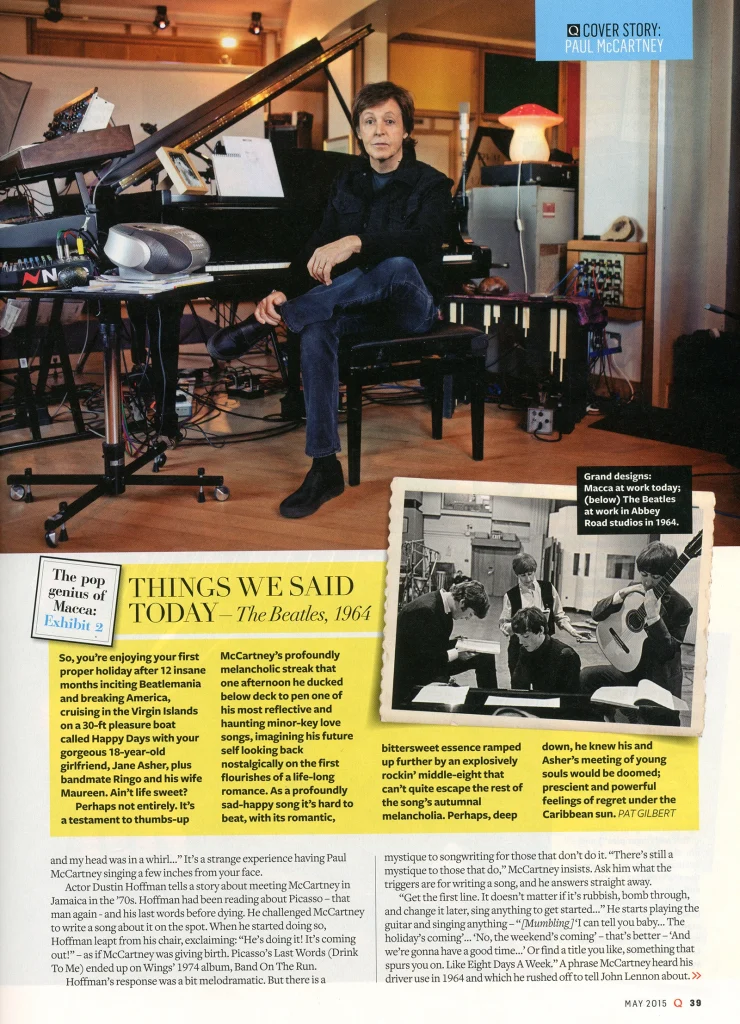
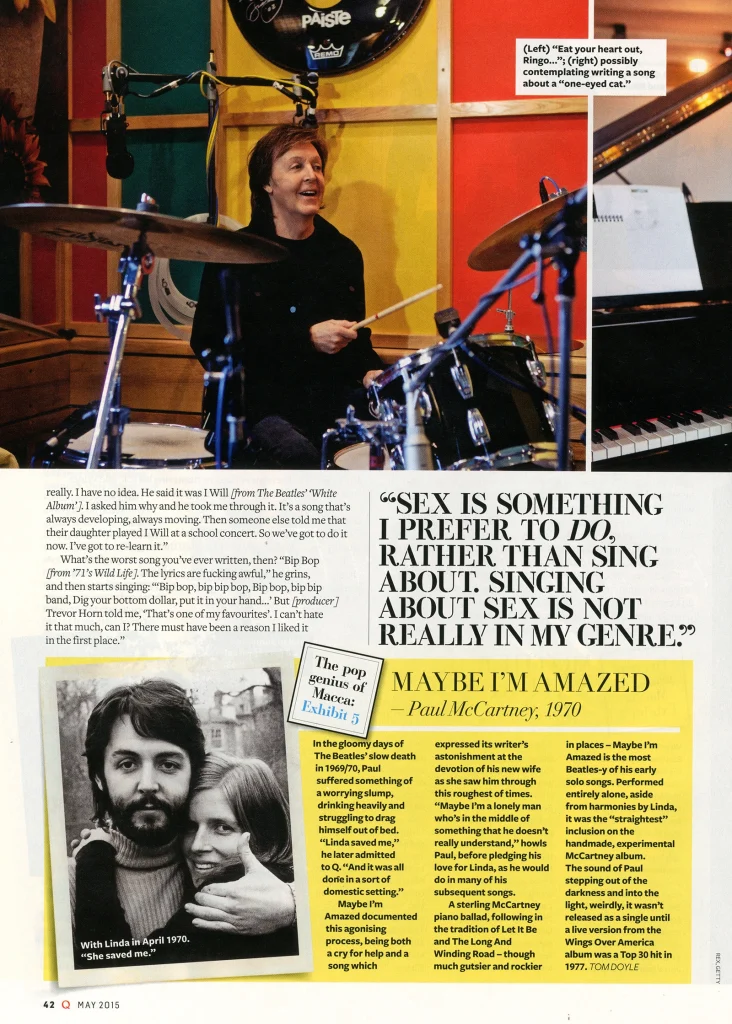

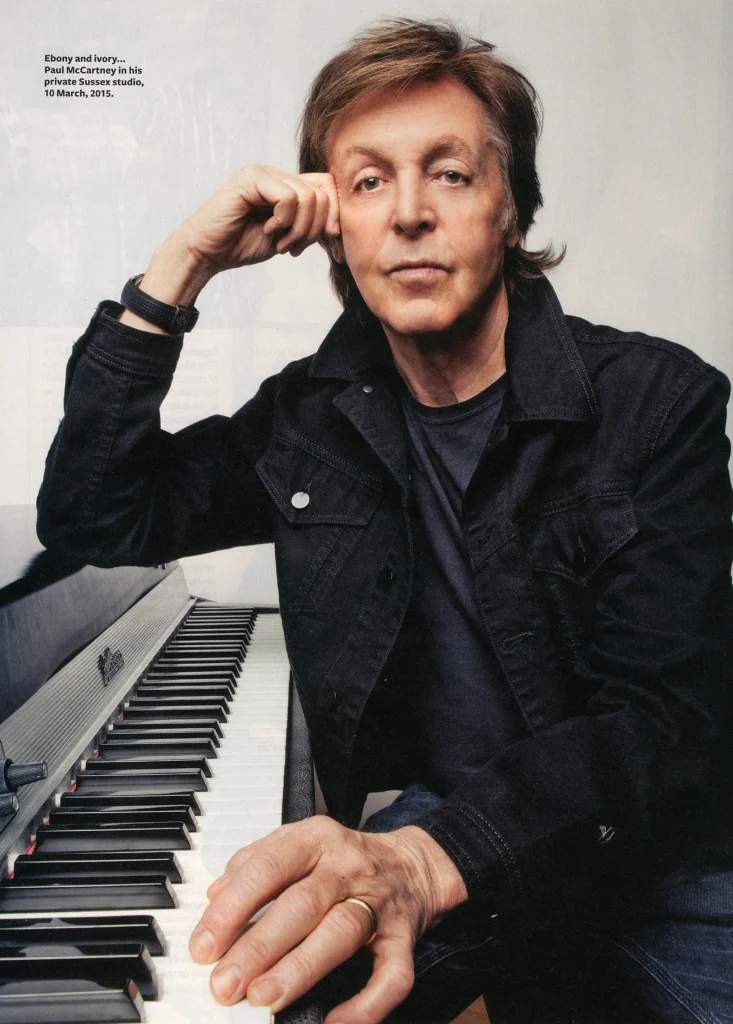
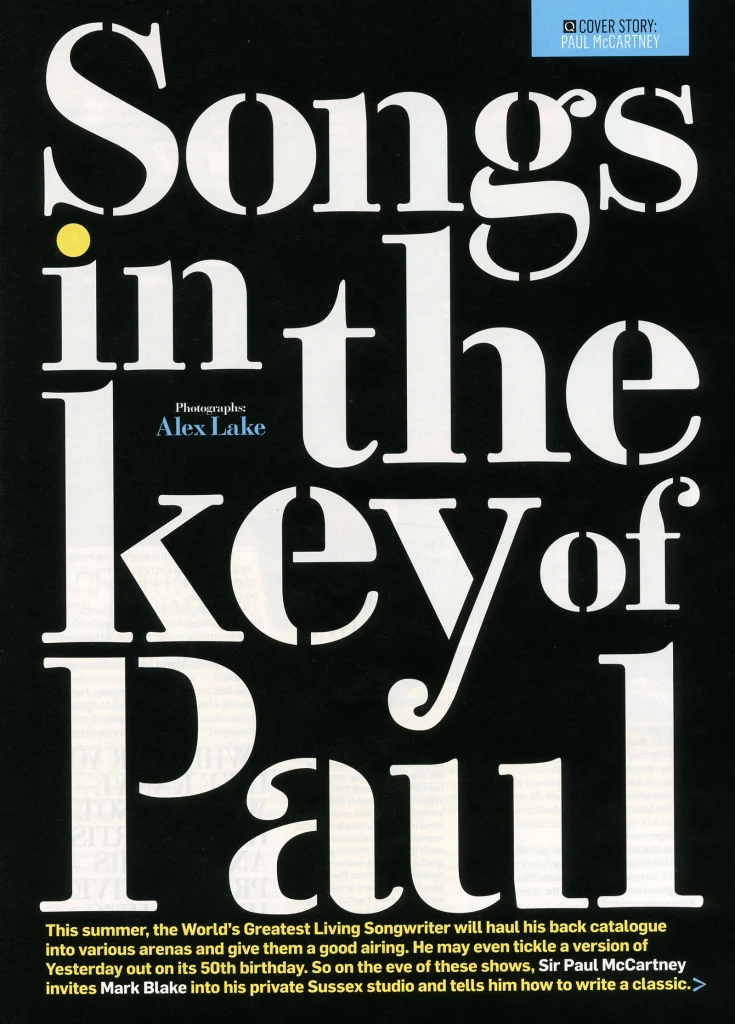
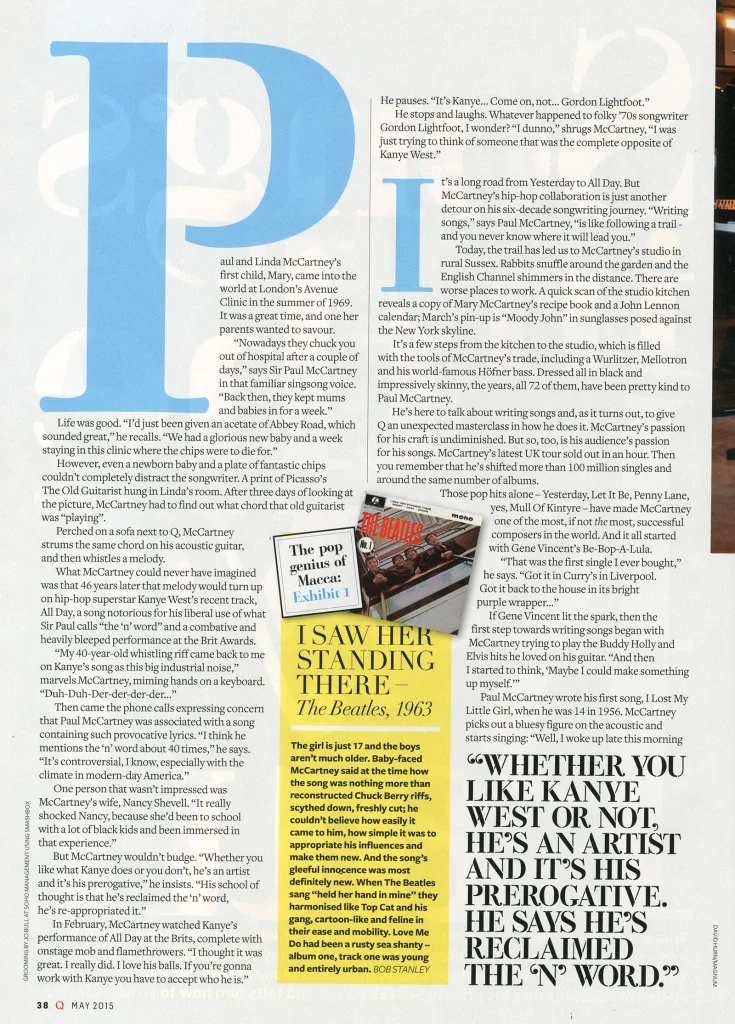


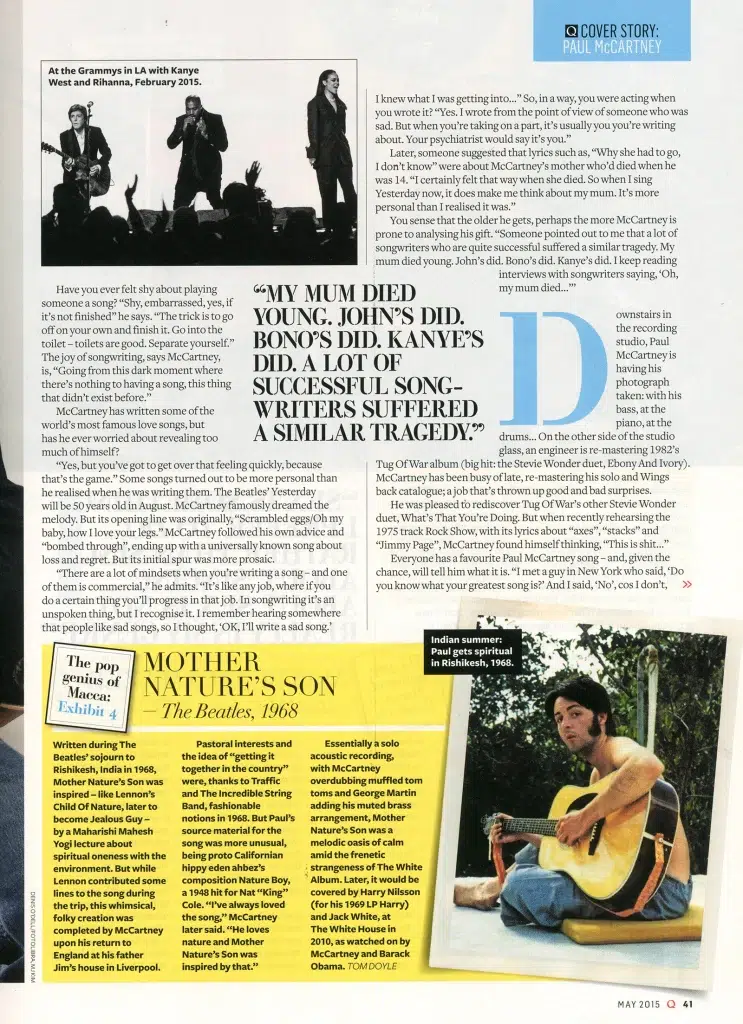


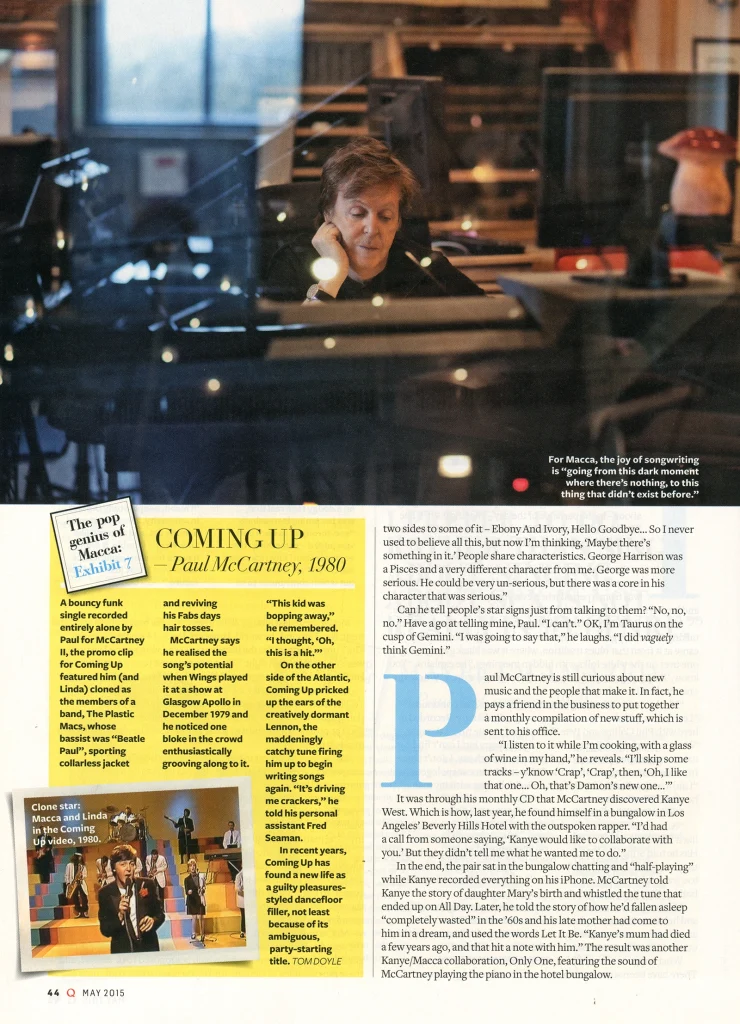


Notice any inaccuracies on this page? Have additional insights or ideas for new content? Or just want to share your thoughts? We value your feedback! Please use the form below to get in touch with us.